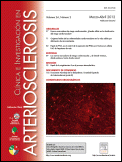
Clinica e Investigacion en Arteriosclerosis
Scope & Guideline
Exploring innovative solutions in arterial disease management.
Introduction
Aims and Scopes
- Cardiovascular Risk Assessment and Management:
The journal emphasizes the assessment of cardiovascular risks through various biomarkers, imaging techniques, and lifestyle factors, aiming to improve prevention strategies. - Lipidology and Dyslipidemia:
A core area of focus is the study of lipids and their role in cardiovascular diseases, including the treatment and management of dyslipidemia through pharmacological and non-pharmacological approaches. - Atherosclerosis Mechanisms and Pathophysiology:
Research addressing the biological mechanisms underlying atherosclerosis, including inflammation, oxidative stress, and genetic factors, is a significant aspect of the journal's scope. - Clinical Interventions and Treatment Outcomes:
The journal publishes studies on clinical interventions, including drug therapies (e.g., PCSK9 inhibitors) and lifestyle modifications, evaluating their effectiveness in managing cardiovascular diseases. - Population Health and Epidemiology:
There is a consistent focus on epidemiological studies that explore the prevalence and impact of cardiovascular risk factors in diverse populations, particularly in Latin America.
Trending and Emerging
- Telemedicine and Remote Monitoring:
The rise of telehealth solutions, particularly in monitoring cardiovascular health remotely, has gained traction, especially post-COVID-19, indicating a shift towards incorporating technology in patient care. - Microbiome and Cardiovascular Health:
Research exploring the relationship between gut microbiota and cardiovascular risk factors is emerging as a crucial area, with implications for understanding disease mechanisms and treatment. - Personalized Medicine in Cardiovascular Treatment:
There is a growing emphasis on personalized approaches to cardiovascular treatment, recognizing the importance of individual patient characteristics in therapy effectiveness. - Impact of Lifestyle Factors on Cardiovascular Risk:
Recent studies increasingly focus on the interrelation between lifestyle choices (dietary patterns, physical activity) and cardiovascular health, emphasizing preventive strategies. - COVID-19 and Cardiovascular Implications:
The ongoing impact of COVID-19 on cardiovascular health is a prominent theme, with research investigating the virus's effects on lipid profiles and cardiovascular risk.
Declining or Waning
- Traditional Dietary Approaches:
As newer insights into the microbiome and advanced nutritional strategies gain attention, traditional dietary guidelines appear less frequently in recent publications. - Basic Research on Lipid Metabolism:
There seems to be a decline in basic science studies purely focused on lipid metabolism without direct clinical implications, as the journal shifts towards translational research. - Generalized Risk Factors without Specific Context:
Publications that discuss generalized cardiovascular risk factors without specific contextual or population-based insights are becoming less common. - Single Biomarker Studies:
There is a noticeable reduction in studies focusing exclusively on single biomarkers, as the trend is moving towards comprehensive models and multifactorial approaches.
Similar Journals

Journal of Atherosclerosis and Thrombosis
Fostering critical conversations in atherosclerosis and thrombosis.Journal of Atherosclerosis and Thrombosis is a leading academic publication dedicated to advancing research in the fields of cardiovascular medicine, biochemistry, and internal medicine. Published by the Japan Atherosclerosis Society, this esteemed journal operates from its headquarters in Tokyo, Japan, and has been a vital resource in its area since its inception in 1994. With its robust impact in Cardiology and Cardiovascular Medicine, ranking in the top quartile (Q1) as of 2023, and a commendable standing in Internal Medicine and Biochemistry, the journal fosters an environment of innovation and discovery, showcasing significant studies and advancements that shape clinical practices and therapeutic approaches. Though not an open-access publication, it offers a wealth of insights to researchers, professionals, and students seeking to deepen their understanding of atherosclerosis and thrombosis. By continually featuring high-quality articles, the Journal of Atherosclerosis and Thrombosis plays an essential role in bridging the gap between research and practice, facilitating critical conversations that influence the future of cardiovascular health.
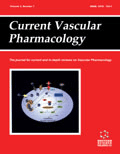
Current Vascular Pharmacology
Exploring the Frontiers of Cardiovascular PharmacologyCurrent Vascular Pharmacology is a premier academic journal published by Bentham Science Publications Ltd, focusing on the intersection of pharmacology and cardiovascular medicine. With an impact factor that reflects its significance in the field, this journal ranks in the Q1 category for both Pharmacology and Cardiology, showcasing its dedication to high-quality research. Its Scopus ranks place it in the top percentile of its categories, highlighting its influence among scholars and practitioners alike. Issued since 2003 and continuing through 2024, Current Vascular Pharmacology aims to disseminate cutting-edge findings and foster knowledge exchange among researchers, professionals, and students engaged in cardiovascular pharmacology. Despite being a subscription-based journal, it remains a vital resource for those seeking the latest advancements in drug development and therapeutic interventions for vascular diseases. Located in the United Arab Emirates, the journal serves as an essential platform for global discourse on vascular health.

HEART
Elevating Patient Care with Groundbreaking ResearchHEART is a leading peer-reviewed journal published by the BMJ Publishing Group, specializing in the field of Cardiology and Cardiovascular Medicine. Established in 1942, the journal has evolved as a premier platform for disseminating high-quality research, innovative practices, and clinical advancements within the cardiovascular domain. With an impressive impact factor and ranked in the Q1 category in 2023, it positions itself among the top-tier journals in its field, boasting a Scopus rank of #37 out of 387 in this highly competitive area, representing the top 10th percentile nationally. The journal supports both traditional and open access options, thereby enhancing the global visibility and reach of its published work. Researchers, professionals, and students alike will find HEART to be an invaluable resource, offering the latest insights and developments that drive the field forward and improve patient care worldwide.
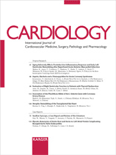
CARDIOLOGY
Advancing cardiovascular knowledge for a healthier tomorrow.CARDIOLOGY, published by KARGER, is a renowned scholarly journal dedicated to the advancement of research in the fields of cardiology and cardiovascular medicine. Since its inception in 1937, the journal has consistently provided a platform for high-quality, peer-reviewed articles that contribute to the understanding and treatment of heart and vascular diseases. With an impressive convergence through 2024, CARDIOLOGY holds a respectable Q2 ranking in both the Cardiology and Cardiovascular Medicine and Pharmacology (medical) categories, placing it within the 53rd and 45th percentiles of respective Scopus ranks. Based in Switzerland, the journal serves as an essential resource for researchers and practitioners aiming to stay abreast of cutting-edge developments and evidence-based practices in cardiovascular health. While it currently does not offer open access options, its commitment to rigorous scientific standards solidifies its significance within the academic community. We invite readers to explore the latest research findings and contribute to this vital field through publications in CARDIOLOGY.
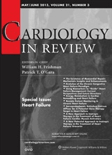
Cardiology in Review
Innovating the future of heart health through rigorous analysis.Cardiology in Review, published by Lippincott Williams & Wilkins, is a prominent journal focused on advancing the field of cardiology and cardiovascular medicine. With a history of publication spanning from 1995 to 2024, the journal serves as an essential resource for researchers, healthcare professionals, and students alike, offering in-depth reviews and analyses on the latest developments, clinical practices, and research findings in cardiology. Despite being a traditional print journal, it maintains a commendable Q2 ranking in both cardiology and miscellaneous medicine categories as of 2023, reflecting its influence and rigor in the academic community, with a Scopus rank of #132 out of 387 in its field, placing it in the 66th percentile. The journal aims to bridge the gap between clinical practice and emerging research, promoting a deeper understanding and integration of innovative strategies in cardiovascular care. With its commitment to high-quality scholarship, Cardiology in Review remains a vital conduit for knowledge and dialogue within the evolving landscape of cardiovascular health.

Acta Cardiologica Sinica
Championing Excellence in Cardiovascular Research.Acta Cardiologica Sinica is a distinguished journal dedicated to the advancement of cardiology and cardiovascular medicine, published by the Taiwan Society of Cardiology. Since its inception in 1988, this journal has provided a platform for researchers and clinicians to share cutting-edge findings and insights into cardiac health, cardiovascular diseases, and innovative treatment strategies. With an impressive Q3 classification in the Cardiology category for 2023, the journal is recognized for its contributions to the field, ranked #208 out of 387 in Scopus, placing it within the 46th percentile of medical journals. Although it currently does not offer open access options, it remains a valued resource for the global cardiovascular community. The journal's commitment to disseminating high-quality research papers, reviews, and case studies ensures that it plays a vital role in improving cardiovascular health practices and outcomes. For researchers, professionals, and students alike, Acta Cardiologica Sinica is essential reading for staying informed about the latest developments in cardiology.
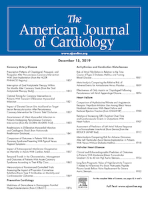
AMERICAN JOURNAL OF CARDIOLOGY
Shaping the Future of Cardiology Through Rigorous ResearchThe American Journal of Cardiology is a leading peer-reviewed journal in the field of Cardiology and Cardiovascular Medicine, published by Excerpta Medica Inc-Elsevier Science Inc. Since its inception in 1958, the journal has consistently contributed to the advancement of cardiovascular research, providing a platform for groundbreaking studies and clinical findings that shape modern medical practices. With an impressive impact factor placing it in the Q1 category in its field for 2023, it ranks among the top journals in medicine, with a rank of #155 out of 387 in the Scopus database, reflecting its significance and rigorous editorial standards. The journal is committed to disseminating high-quality research that fosters innovation and enhances clinical outcomes in cardiology. Although it does not provide Open Access options, the American Journal of Cardiology remains an essential resource for researchers, healthcare professionals, and students looking to deepen their understanding of cardiovascular health.

VASCULAR MEDICINE
Pioneering insights in vascular medicine for a healthier tomorrow.Vascular Medicine is a premier academic journal for researchers and practitioners in the field of cardiovascular health, published by SAGE Publications Ltd. With an ISSN of 1358-863X and E-ISSN 1477-0377, this esteemed journal has been at the forefront of publishing quality research since its inception in 1992, with convergence extending to 2024. Ranked in the Q2 category for both Cardiology and Cardiovascular Medicine as well as for miscellaneous Medicine in 2023, it is recognized for its significant contributions to advancing knowledge and clinical practice within these domains. Its Scopus ranking situates it at #91 out of 387 in the field, reflecting its high impact and the relevance of its published research, which is crucial for addressing the challenges in vascular health today. Although it is not an open-access journal, Vascular Medicine remains dedicated to disseminating vital findings that bridge the gap between research and clinical application, making it an essential resource for medical researchers, healthcare professionals, and students alike.
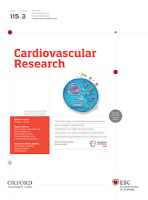
CARDIOVASCULAR RESEARCH
Connecting research to real-world cardiovascular solutions.CARDIOVASCULAR RESEARCH, published by Oxford University Press, is a premier academic journal dedicated to the evolving field of cardiology and cardiovascular medicine. With a remarkable impact factor reflecting its significant contribution to the scientific community, this journal maintains a Q1 ranking in both Cardiology and Physiology categories, demonstrating its commitment to publishing high-quality research that influences clinical practices and healthcare outcomes. Established in 1967, the journal has consistently provided a platform for innovative studies and reviews, aiming to advance our understanding of cardiovascular physiology and pathology. Researchers, professionals, and students will find published articles crucial for their work, as the journal covers a broad spectrum of topics including molecular biology, genetics, and clinical studies. While currently not offering open access options, CARDIOVASCULAR RESEARCH remains accessible through institutional and individual subscriptions, ensuring that the latest findings are available to those in the cardiovascular science community.

Frontiers in Cardiovascular Medicine
Empowering Researchers to Transform Cardiovascular Care.Frontiers in Cardiovascular Medicine is a leading open-access journal published by FRONTIERS MEDIA SA, dedicated to advancing research in the field of cardiology and cardiovascular medicine. Since its inception in 2014, the journal has become a vital platform for the dissemination of high-quality research, boasting a commendable Q2 rank in the 2023 category for Cardiology and Cardiovascular Medicine. With a focus on promoting innovative studies and clinical insights, Frontiers in Cardiovascular Medicine facilitates open access to its content, allowing researchers, healthcare professionals, and students from around the globe to engage with the latest findings which are critical for the advancement of cardiovascular health. The journal's significant presence in the academic landscape, as indicated by its Scopus ranking (161/387 and 58th percentile), underscores its importance as a research outlet in this essential field. Located in Lausanne, Switzerland, the journal continues to support the global cardiovascular community by encouraging collaboration and knowledge sharing to address the challenges faced in cardiovascular medicine today.